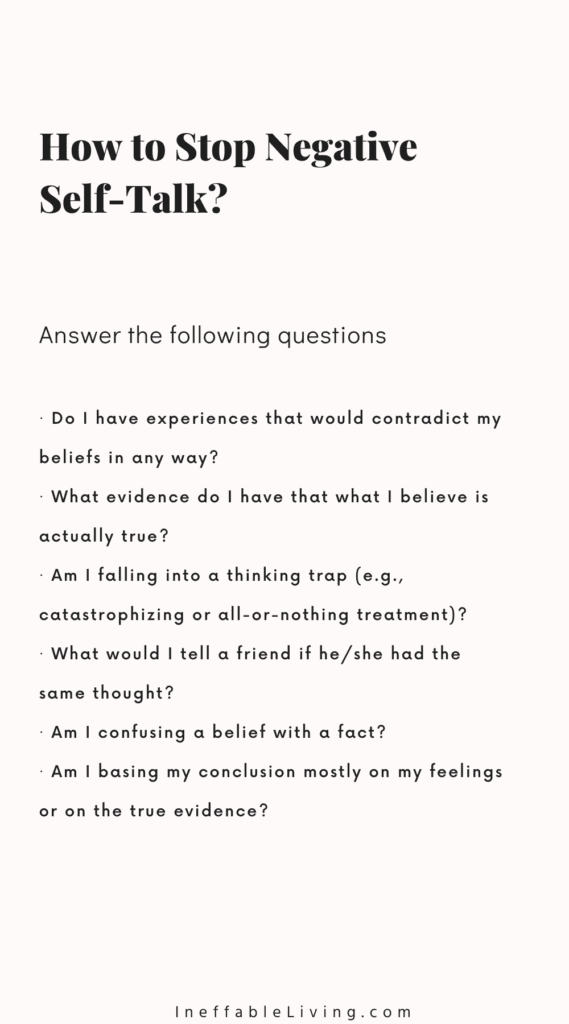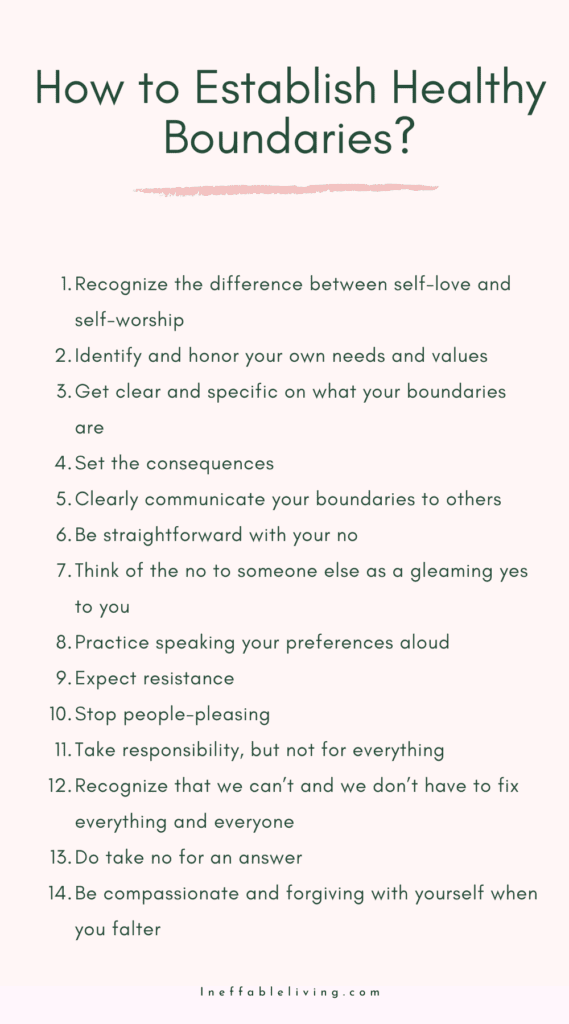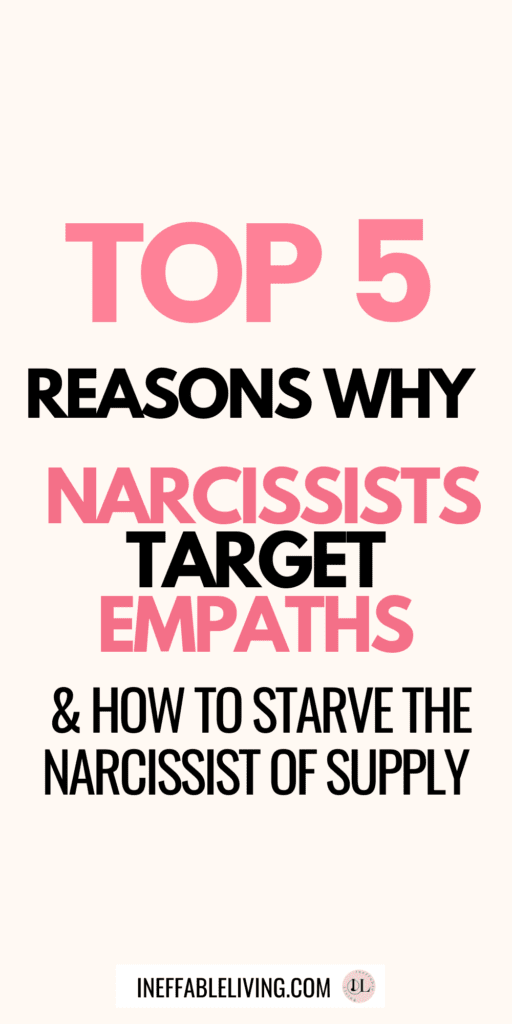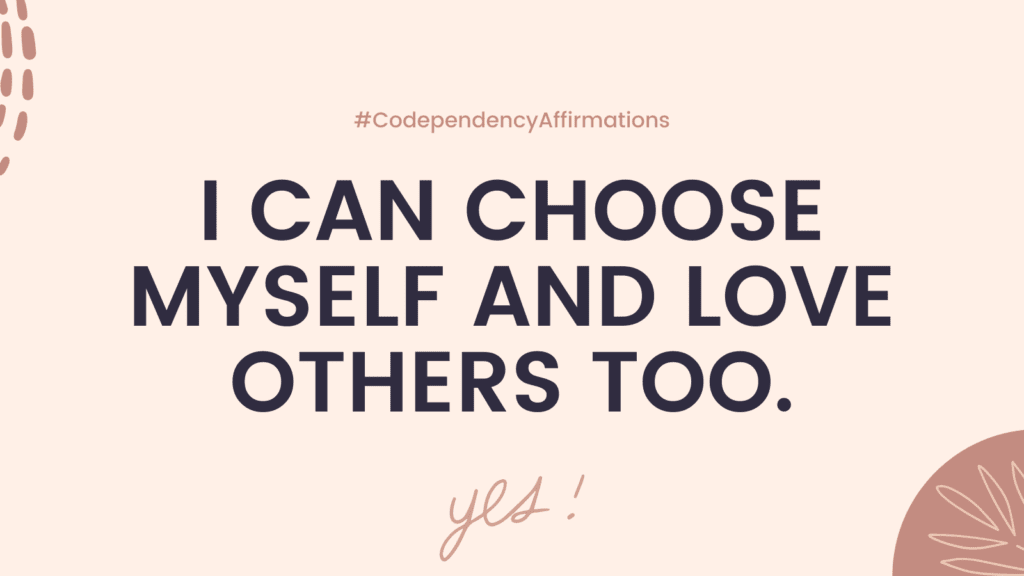Today, you’re going to learn all about the relationship between empaths and narcissists: the top 5 reasons why narcissists target empaths and how to protect yourself from their abuse and starve the narcissist of supply.
Empaths with their strong need for connection, weak boundaries, and compromised internal strength make perfect targets for a narcissist.
To get the upper hand, the narcissist only has to emotionally bombard the Empath to coerce them into cooperating with their demands.
- What Is Narcissistic Supply?
- Why Do Narcissists Target Empaths? 5 Reasons Narcissists Target Empaths
- The False Self of The Narcissist
- Why Empaths Attract Narcissistic People
- Being Empathic And Codependent
- Why The Narcissist Worries After Discarding You
- Empaths And Narcissists: How Do Empaths Protect Themselves From Narcissists?
- Can A Narcissist Be Faithful?
- Why A Narcissist Won’t Divorce You?
- What Happens When An Empath Leaves A Narcissist?
- Conclusion
- FAQ
What Is Narcissistic Supply?
Narcissistic supply refers to the constant supply of attention and admiration needed by narcissists.
Narcissists need and even demand admiration and validation to feed their sense of entitlement and self-centeredness. They will deliberately seek situations in which they are regularly at the center of attention.
However, no matter how much attention they receive, narcissists are never satisfied. Once the supply is received, the narcissist will soon become low or empty.
Related: Top 8 Dysfunctional Family Roles
Why Do Narcissists Target Empaths? 5 Reasons Narcissists Target Empaths
Do narcissists target empaths?
Because narcissists are unable to make healthy connections, they tend to target people who are more vulnerable in order to get their supply of attention and admiration.
The following are common traits that make empaths ideal targets for a narcissist:
1. They are intuitive and have high emotional intelligence, which makes them very attuned to the emotions of others, even going as far as to take on these emotions, something that can drain the Empath’s energy.
2. They are good listeners and often give their attention for long periods of time.
3. They have a deep need for emotional connection with others and they suffer when isolated. This need can sometimes be stronger than reason and common sense and usually make their boundaries weak.
4. They have more difficulty than others in keeping up with daily life and would seek out a higher power for support, which can make them more easily influenced than others.
5. Their emotional buttons are easier to push than those of Non-Empaths. This means that even the smallest attack can shake them up. When someone else shows intense emotions of sadness or anger, they feel bombarded, and their anxiety increases.
Related: When A Narcissist Sees You Cry: Top 13 Reactions You May Be Familiar With
The False Self of The Narcissist
To gain their supply of attention and admiration, narcissists will often use a “false self” that is likable to attract people to them.
The false self is a construct of the ego. It isn’t based on the person’s emotions. Rather, it is a repertoire of behaviors that make up a personality.
True self needs safety, love, respect, and understanding to thrive, and so when the person is emotionally disconnected or abused, experiencing the true self can be extremely painful.
The false self serves two main purposes:
- It keeps the person from directly experiencing their true self, which reduces the amount of shame and pain felt and makes reality more bearable.
- It allows a person to manipulate their environment in an attempt to get their needs met.
Over their lifetime, the narcissist creates a set of behaviors that form their false self. This keeps the narcissist from feeling their shame and pain, but also keeps others from reaching the narcissist’s true self.
Examples of a false self that narcissists create include:
1. The Storyteller: This narcissist would tell story after story to paint themselves as the person in power.
2. The Victim: This narcissist would feed their victims stories of their misfortune while also rejecting any suggestions for fixing the situation.
Their only intention is to keep others emotionally invested in their problems for as long as possible.
3. The Strong Silent Type: This narcissist has a stoic demeanor. They show no emotion, excitement or weakness and invest little in their relationships.
4. The Clown: This narcissist would make witty remarks to put down other people and would make light of every situation to suck up your attention.
5. The Intellectual: This narcissist uses monologues as a way to entrap other people, sucking up their attention with their words.
The narcissist uses each tool depending on the target. With their empathic sister, they might play the victim and the switch to the clown with their friend.
Related: 13 Traits of a Narcissist — and How to Deal With a Narcissist?
Why Empaths Attract Narcissistic People
Empaths are highly intuitive and emotionally intelligent. They will always make people feel heard and understood.
Empaths are also extremely loyal and caring. They prefer to see the good in people and they can love deeply.
The biggest drawback of being an empath?
There is a tendency to also attract narcissistic people.
A narcissist is mostly concerned about themselves. However, they’re usually incapable of giving themselves what they need, so they seek out people (usually empaths) to fulfill their needs, be it validation, a sense of power, financial support, etc.
The issue with being an empath is their nature to give selflessly. This beautiful trait can be abused by narcissists.
Related: The Narcissist’s Prayer Explained
Being Empathic And Codependent
If you add codependency to being extremely empathetic, then you will most likely find yourself in an abusive relationship.
Being codependent means a lack of sense of self, including a lack of self-love, which pushes you to crave love from others. You become emotionally dependent on someone else to feel pleasure and validation.
When you’re codependent as well as empathetic, you will love your partner the most, but not yourself. This may cause you to tolerate their abuse.
Related: Take The Echoist Quiz (The Opposite Of A Narcissist)
Why The Narcissist Worries After Discarding You
There are several reasons why a narcissist may worry after discarding you:
1. Fear of losing their control: Narcissists thrive on controlling their partners, and when they discard someone, they lose that control. They may worry about the possibility of their ex-partner moving on and finding happiness without them.
2. Fear of abandonment: Narcissists often have deep-seated fears of abandonment, and breaking up with someone can trigger these fears. They may worry about being alone or not being able to find someone who will cater to their needs as much as you did.
3. Fear of losing their source of supply: Narcissists feed off the attention, admiration, and validation they receive from their partners. When they discard someone, they may worry about losing that source of supply and not being able to find someone else to fill that void.
It’s important to remember that their worry is not your responsibility, and you deserve to prioritize your own well-being and healing.
Empaths And Narcissists: How Do Empaths Protect Themselves From Narcissists?
Reversing the damage done by narcissist requires creating opposing experiences, and doing them over and over again until they become integrated.
#1. Heal Your Toxic Shame
Shame can become an identity for many victims of narcissism. It can shape most of their thoughts. They begin to feel shame about wanting or saying anything.
The way to heal your shame is by facing it – by doing/saying what you are afraid to do/say and allowing yourself to open up to and be vulnerable again with safe people.
Related: Top 10 Signs Of Toxic Shame In A Person (+Best 20 Healing Shame Exercises)

#2. Come Back To Reality
If you used dissociation before as a default mode to detach yourself from feeling your painful emotions, you won’t be able to take control of your life again unless you connect with your true self and your emotions.
When you stop numbing your emotions through addictions (bad habits, drugs, alcohol, dependent relationships, etc), initially, you might feel overwhelmed with the build-up of painful emotions coming back to the surface.
Allow yourself to externalize and feel these emotions through trauma-sensitive mindfulness.
#3. Manage Your Emotions
The goal of allowing yourself to feel painful emotions is to learn how to manage these emotions now and in the future.
You want to strengthen the mind/emotion connection, in a way that allows you to feel intense emotions while remaining engaged in your life situation and using your emotional feedback to make balanced decisions.
The ultimate reward for learning how to better manage your emotions is that you begin to realize that regardless of how you’re feeling, you can choose to act in an entirely different way – your emotions won’t have the same pull they used to have on you before.
Practical Exercise – Write A Feeling Journal
Start a journal where you focus on your emotions, not just what happened during the day.
Notice your emotions and put them into words. Doing this consistently will strengthen the mind/emotion connection.
Related: How To Feel Your Feelings & Sit With Painful Emotions? (Top 9 Difficult Emotions)
#4. Develop a Healthy Ego
When you learn how to manage your emotions in a healthy way, these emotions will no longer overwhelm you and you will be able to think clearly and effectively.
As a result, when someone attempts to emotionally manipulate you, you will be acutely aware of it.
People to avoid as friends are people who:
- Are quick to be agreeable and wish to become ‘best friends’ without spending enough time together
- Rarely enquire about your life and well-being
- Consistently switch the topic back to themselves
- Ridicule you and put you down
- Will not emotionally invest in you
Instead, look for people who:
- Appreciate a wide array of your qualities
- Laugh with you, not at you
- Accept that physical and emotional space and boundaries should exist in a friendship
- Can show compassion when you express difficult emotions
- Don’t place heavy expectations on you
Related: Top 18 Self Esteem Exercises (+FREE CBT For Self-Esteem Worksheets PDF)
#5. Develop an Independent Sense of Self
When you look inside and learn to unblend from emotions such as shame and anxiety, you begin to develop a firm presence that cannot be compromised or affected by emotions or situations.
The confident self inside you will become a safe space you can rely on when things get difficult.
Related: Self-Abandonment: What Is It & How To Get Back In Touch With Yourself
#6. Establish Firm Boundaries
One requirement for building a solid, independent sense of self is establishing firm boundaries with other people.
This occurs naturally as you begin to connect with your true self and start protecting it. The more you value and respect yourself, the stronger your boundaries will grow.
When other people, and especially narcissists, test you, they’ll realize that in order to have the best of you, they will need to be respectful.
If it’s not what you want, say no, without excuses.
If you need to adjust the person’s request, say yes, but with a set of conditions.
When you can’t decide, say “I don’t know,” knowing that it’s a valid response and that it’s okay not to give an answer immediately.
If someone is trying to make fun of you, don’t reinforce what they say, and don’t laugh along.
If someone is trying to put you down, don’t try to justify yourself or shame them back.
If you feel confused about someone’s reaction, ask them what they mean exactly and question their motives. You have the right to ask.
Related: How to Firmly Establish and Enforce Healthy Emotional Boundaries?

#7. Find Your Passion
Once you connect with your true self and establish firm boundaries to protect it, you will invest less time and energy on trying to please people and connect deeply with your own needs and desires.
Once shame, guilt, and fear begin to dissipate, you will find the courage to try things you always wanted to do.
Practical Exercise – Self Remembrance
Finding your way to your true self, requires a better understanding of your true self and tangible representations of your subconscious.
This could be achieved through creative activities, like writing, singing, playing an instrument, drawing, etc.
Other ways to help you understand yourself include taking classes, reading psychology or philosophy books, playing a sport, learning an instrument, etc.
Another way to find your way to your true self and connect with your deepest desires and passion is meditation.
Meditation helps you calm down the chatter in your mind and allow you to access your subconscious. The more you sit with yourself, the more you’ll be able to remember your true self.
The instructions are as follows:
1. Find a quiet room where you can sit by yourself uninterrupted.
2. Choose a comfortable position and start by taking a few deep, calming breaths.
3. Try to keep your mind as empty and clear as possible. If any thought comes to your mind, gently, release it and refocus on your breathing.
4. Listen for any intuitive hits that may or may not come through.
Set a timer (the ideal period is 20 minutes).
You can keep your eyes open if it helps you feel safer. Find a basic object to focus on, such as a cup without printing on it.
Can A Narcissist Be Faithful?
It’s possible for a narcissist to be faithful in a relationship, but it’s unlikely.
Narcissists tend to prioritize their own needs and desires above others, and they often have a sense of entitlement that can lead them to cheat or seek out admiration from other partners.
Additionally, narcissists may struggle with empathy and understanding the impact of their actions on others, which can make it challenging for them to maintain a healthy and faithful relationship.
However, every person is unique, and some individuals with narcissistic traits may be able to work on themselves and develop more healthy behaviors and attitudes in relationships.
Why A Narcissist Won’t Divorce You?
A narcissist may be unwilling to divorce you for a variety of reasons, including:
- a desire to maintain control over you,
- fear of being alone,
- a need to protect their image or reputation,
- financial gain
Narcissists often have an exaggerated sense of self-importance and entitlement, and if they feel that they are losing control over you through a divorce, they may resist the process.
Additionally, they may use the divorce process as an opportunity to manipulate or emotionally abuse you.
It is important to seek help from a qualified therapist or legal professional if you are experiencing difficulties divorcing a narcissist.
What Happens When An Empath Leaves A Narcissist?
Leaving a narcissist can be a challenging but ultimately empowering experience for an empath. It allows them to reclaim their autonomy and rediscover their sense of self-worth.
The narcissist may try to manipulate the empath into staying by making promises or using tactics like gaslighting or love bombing.
However, once the empath is able to break free from the narcissist’s hold, they may feel a sense of relief and freedom.
The empath may also need time to heal from any emotional wounds that the narcissist inflicted on them.
This can involve therapy, self-care, and support from loved ones.
Conclusion
Reversing the damage of the narcissist and finding your true self again can be a long journey, so be kind to yourself.
Hold the judgments and allow your true self space to simply be. Remind yourself that you are worthy of love and respect and be the first to give yourself that.
Related: 8 Stages Of Healing After Narcissistic Abuse (+FREE Breakup Recovery Worksheets)
FAQ
How Long Can A Narcissist Go Without Supply?
A narcissist can go without supply for varying lengths of time, but they will eventually start to feel the effects of their lack of attention and admiration.
The length of time it takes for a narcissist to experience withdrawal symptoms from a lack of supply depends on several factors, including the severity of their narcissism, the availability of other sources of supply, and their level of self-awareness.
Some narcissists may be able to go for a short time without needing external validation and attention, while others may experience immediate distress and feelings of emptiness.
In general, though, most narcissists cannot sustain a period of time without supply for very long, and they will often seek out new sources of attention and admiration as soon as possible to fill the void.
Does A Narcissist Miss You?
It’s important to understand that narcissists typically have a lack of empathy and may struggle with genuine feelings of connection towards others.
While it is possible for a narcissist to feel a sense of loss or nostalgia after the end of a relationship, it is often more about losing control or missing the attention and admiration they received.
How Long Will A Narcissist Ignore You?
The length of time a narcissist will ignore you varies depending on the situation and their personal behavior patterns.
Narcissists often have an inconsistent and unpredictable behavior, including ignoring and re-engaging with people.
In some cases, they may ignore someone for just a few hours or days, while in other situations, they may ignore someone for much longer periods, such as weeks, months, or even years.
It is important to remember that the actions of a narcissist are often driven by their own needs and desires, not necessarily by the actions of others.
Do Narcissists Come Back After Silent Treatment?
Yes, it is possible for narcissists to come back after giving someone the silent treatment.
Narcissists often use this tactic as a way to control and manipulate others, and they may come back seeking validation, attention, or to continue their pattern of control.
Can A Narcissist Fall In Love Permanently?
It is possible for a narcissist to fall in love permanently, but it is rare.
Narcissists often struggle with forming deep and meaningful relationships because they prioritize their own needs and desires above those of others.
They may become infatuated with someone and project their idealized version onto them, but they may become bored or move on once that person no longer meets their needs or fails to continue to feed their ego.
How Do Narcissists Feel When You Move On?
Narcissists typically feel a range of negative emotions when someone moves on from them, including anger, jealousy, frustration, and even despair.
Because narcissists have an excessive sense of entitlement and believe they are superior to others, they often struggle to accept rejection or abandonment.
When someone moves on, it challenges their self-image and can cause them to feel a sense of loss of control over the situation.
In some cases, narcissists may try to win back the person who moved on or seek revenge for the perceived “disrespect” to their ego.
However, not all individuals with narcissistic traits will react in the same way and that these behaviors can vary greatly depending on the individual’s coping mechanisms, level of self-awareness, and willingness to seek help.

Resources
- Portions of this article were adapted from the book How To Kill A Narcissist, © 2016 by J. H. Simon. All rights reserved.
- You Probably Think this Paper’s About You: Narcissists’ Perceptions of their Personality and Reputation – PMC (nih.gov)
- Narcissism Driven by Insecurity, Not Grandiose Sense of Self, New Psychology Research Shows (nyu.edu)
- Narcissism study sheds new light on the relationship between grandiose and vulnerable subtypes (psypost.org)
- Study shows Narcissistic Personality Disorder may have a biological component – UChicago Medicine
- Study Finds Link Between Narcissism and Aggression (verywellmind.com)
- A Study of Narcissism, Affiliation, Intimacy, and Power Motives among Students in Business Administration – Lynne Carroll, 1987 (sagepub.com)
- There Are Two Types of Narcissist, And The Difference Is Crucial, Research Shows (sciencealert.com)
- Effects of Narcissistic Abuse (verywellmind.com)
- The Effect of Pathological Narcissism on Interpersonal and Affective Processes in Social Interactions – PMC (nih.gov)
- 12 Signs You Might Have Narcissistic Victim Syndrome (healthline.com)
- Narcissistic personality disorder – Symptoms and causes – Mayo Clinic
- Frontiers | The Higher the Score, the Darker the Core: The Nonlinear Association Between Grandiose and Vulnerable Narcissism | Psychology (frontiersin.org)
- (PDF) Narcissistic Personality Disorder: Impact on Relationships (researchgate.net)
- Mediation effect of narcissism on the relationship between empathy and the quality of interpersonal relationships – ScienceDirect
- Narcissism: 5 Signs to Help You Spot Narcissistic Behavior (webmd.com)



